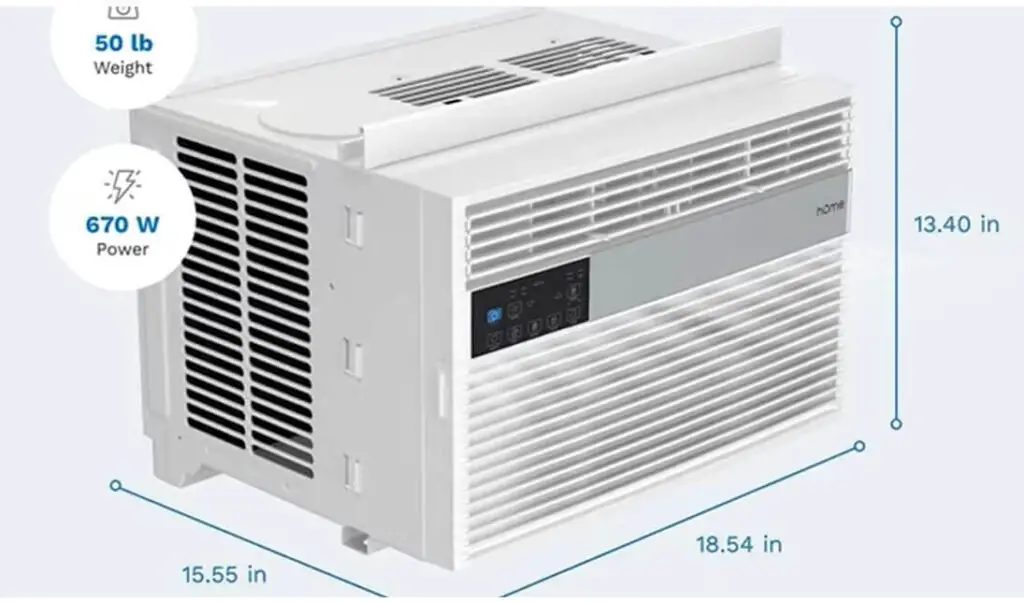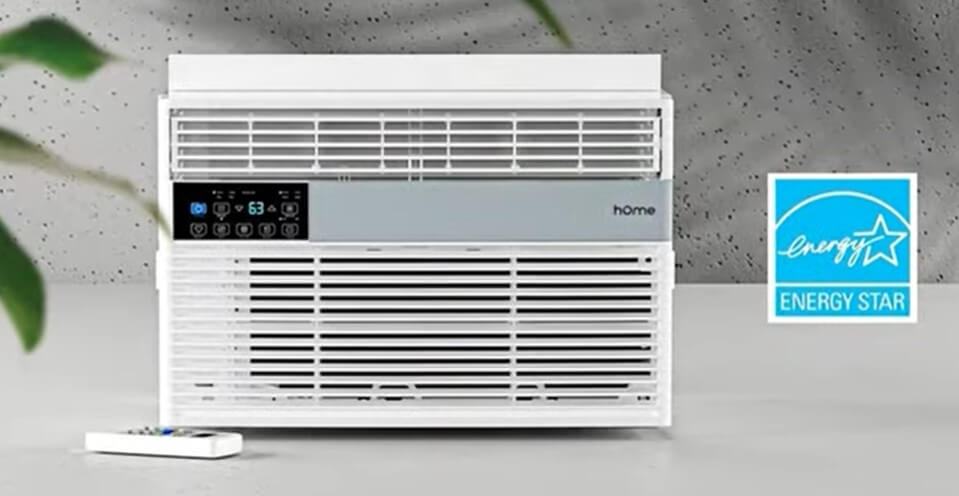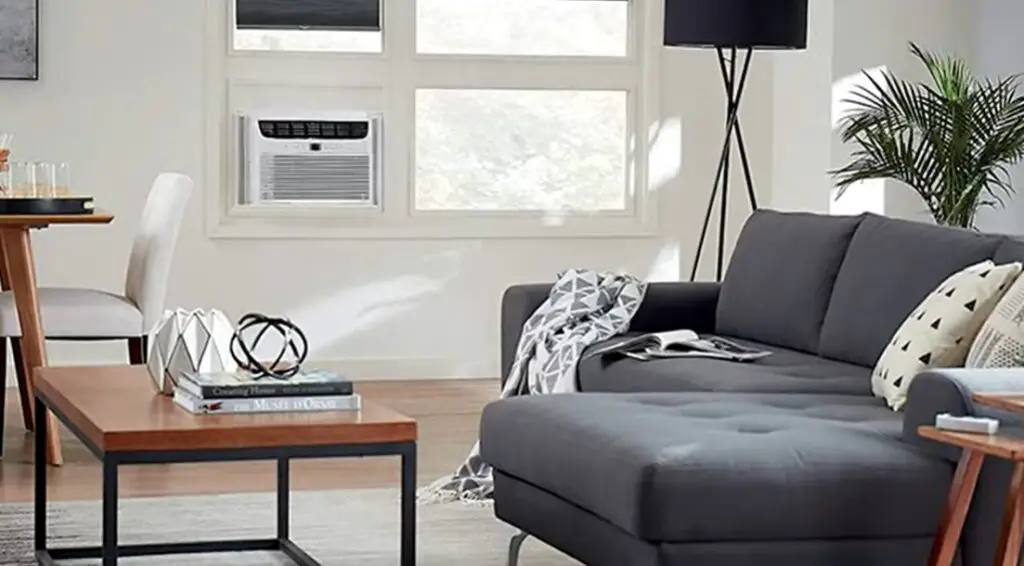Window unit costs can range from $150 to $750 depending on features and size. Window air conditioning units are an affordable option for cooling smaller living spaces such as apartments or bedrooms.
Prices can vary based on factors such as size, energy efficiency rating, and additional features like remote controls or air purifiers. It’s important to consider the size of the unit in relation to the room it will be cooling, as a unit that is too small will not effectively cool the space. While an oversized unit will waste energy and lead to higher electricity bills.
Investing in an energy-efficient unit can help offset costs in the long run, as it will use less electricity to cool the room. Some popular brands for window ac units include Frigidaire, LG, and GE.

Factors That Determine The Cost Of A Window Unit
Window ac units are a popular and cost effective way of cooling your room during the summer months. Factors that determine the cost of a window unit include its size, brand and model, cooling capacity, features and functionalities, energy efficiency rating, and installation costs and requirements.
Let’s dive in!
Size Of The Unit
The size of the window unit you need depends on the size of your room and its cooling requirements. Large rooms require units with higher cooling capacities, which increases the cost of the unit. Similarly, a higher BTU (British thermal units) rating of a unit will result in a higher cost.
Here are some factors to consider:
- The larger the unit, the more expensive it will be.
- The larger the room, the larger the unit needed to cool it.
- The higher the btu rating, the more powerful the unit and the more expensive it will be.

Brand And Model
The brand and model of a window unit affect the cost. Popular brands with high customer satisfaction rates often cost more than lesser-known brands. Similarly, newer models with advanced features typically cost more than older models. Here are some things to keep in mind:
- Popular brands such as LG, Frigidaire, and Ge cost more than their lesser-known counterparts.
- Newer models with advanced features come with a higher price tag.
Cooling Capacity
As mentioned earlier, cooling capacity is measured in BTUs, and the higher the BTU rating, the more powerful the unit. The cooling capacity required depends on the size of the room, the number of windows, ceiling height, and insulation. Here’s what you need to know:
- A larger room requires a unit with a higher cooling capacity, which increases its cost.
- The number of windows and ceiling height of the room also plays a role in determining the unit’s cooling capacity and cost.
Features And Functionalities
Window ac units come with various features and functionalities that affect their cost. Basic models with no advanced features are often cheaper than units with more features. Here are some things to keep in mind:
- A unit with a digital thermostat will cost more than one with a manual dial.
- Additional features such as a remote control, air purifier, or dehumidifier will add to the cost.

Energy Efficiency Rating
The energy efficiency rating (EER) of a window unit tells you how energy-efficient it is. A higher EER means that the unit uses less energy, thus saving you money in the long run. Here are some things to keep in mind:
- Units with a higher EER are more expensive initially but will save you money in the long run.
- Look for units with an energy star certification for the highest level of efficiency.
Installation Costs And Requirements
Installation cost depends on the complexity of the installation, the location of the window, and the tools required. Some units may require professional installation, which will add to the cost. Here are some things to keep in mind:
- A unit that requires professional installation will cost more.
- Make sure you have the necessary tools and equipment before attempting self-installation to avoid additional costs.
Several factors affect the cost of a window unit. Consider your room’s size, cooling requirements, features and functionalities, energy efficiency rating, and installation costs and requirements to make an informed purchase.
Price Ranges For Window Units
Window units are a fantastic solution for individuals who want to cool a small space with a tight budget. Apart from their ease of installation, these units are cost-effective and energy-efficient. In this section, we will explore the price ranges of window units, their features, and the value offered at different price points.
Let’s take a closer look at the low-end, mid-range, and high-end window units.
Low-End Window Units And Their Price Ranges
Low-end window units are a great option for budget-conscious individuals, but it does not necessarily mean that quality is sacrificed. These window units can effectively cool smaller spaces such as bedrooms and home offices. Here are some key points about low-end window units:
- Price ranges between $100 to $250, depending on the brand, features, and specifications.
- Typically, these units have a cooling capacity of 5,000 to 6,000 BTUs, suitable for spaces up to 250 square feet.
- These models may not have as many features as their high-end counterparts. However, they usually have multiple cooling settings, a basic display, and a remote control.
- Ideal for someone who only needs to use the unit for a specific period of time or for a small living space.
Mid-Range Window Units And Their Price Ranges
Mid-range window units strike a balance between affordability and functionality. They are perfect for those who want to cool larger areas and are willing to spend a bit more money. Here are some key points about mid-range window units:
- Price ranges between $250 to $450, depending on the brand, features, and specifications.
- Typically, these units have a cooling capacity of 7,000 to 12,000 BTUs, suitable for spaces up to 550 square feet.
- Models may come with additional features such as adjustable thermostats, timers, and energy-saving modes.
- Ideal for someone who needs to use the unit for an extended period or for a medium-sized living space.
High-End Window Units And Their Price Ranges
High-end window units typically have more features and a higher cooling capacity, making them great for cooling larger spaces. These units can keep a room cool and comfortable under the most extreme weather conditions. Here are some key points about high-end window units:
- Price ranges between $450 to $800, depending on the brand, features, and specifications.
- Typically, these units have a cooling capacity of 12,000 to 25,000 BTUs, suitable for spaces up to 1,600 square feet.
- Models may come with additional features such as multiple cooling and fan speeds, smart controls, and quiet operation.
- Ideal for someone who needs to use the unit frequently, or for a large living space.
Comparison Of Different Price Ranges And Their Respective Features
It is essential to consider the value offered at different price points to make an informed decision when purchasing a window unit. Here is a quick comparison of the features offered at different price points.
- Low-end window units: Affordable, ideal for small spaces, and basic features such as remote control.
- Mid-range window units: Ideal for medium-sized spaces, additional features such as timers, and energy-saving modes.
- High-end window units: Ideal for larger spaces, additional features such as smart controls, and quiet operation.
Window units are a fantastic investment for anyone who wants to keep their living space cool and comfortable. The right window unit will depend on your personal needs, the size of the room you want to cool, and your budget.
With the information we have provided here, you’ll be able to make an informed decision about which window unit you need.
Calculating The Total Cost Of Owning A Window Unit
Many homeowners are looking for cost-effective ways to cool their homes during the hot summer months. Window air conditioning units are a popular option, but how much do they really cost? In this post, we’ll discuss everything you need to know about the total cost of owning a window unit.
Initial Costs
Before purchasing a window unit, it’s important to consider the initial costs. Here are some typical expenses:
- Window unit price: Depending on the brand and features, you can expect to spend anywhere from $100 to $1000 for a window unit.
- Installation costs: If you don’t feel comfortable installing the unit yourself, expect to pay a professional around $100-$200 for installation.
Maintenance Costs
Window units require regular maintenance to keep functioning properly. Here are some common maintenance costs to consider:
- Cleaning supplies: You’ll need to purchase cleaning supplies such as a coil cleaner and filter cleaning solution. This typically costs around $20.
- Filter replacement: You’ll need to replace the filter every 1-3 months, depending on how much you use the unit. A replacement filter typically costs around $10.
- Repair costs: If your window unit experiences any issues, you may need to pay for repairs. The cost will depend on the complexity of the issue and whether or not the unit is under warranty.
Energy Costs
While window units are generally cheaper than central air conditioning units, they can still increase your electricity bill. Here are some factors that affect energy costs:
- Unit size: A larger unit will consume more energy than a smaller unit.
- Usage: Obviously, the more you use your window unit, the higher your electricity bill will be.
- Energy efficiency rating: Some window units have an energy efficiency rating (EER) listed on the label. The higher the EER, the more energy-efficient the unit is.
Cost-Benefit Analysis Of Window Units Compared To Other Air Conditioning Options
Is a window unit the best option for you? Here are some pros and cons to consider:
Pros Of Window Units
- Affordable initial costs compared to central ac
- Easy to install
- Easy to move from room to room
- Suitable for small homes or apartments
Cons Of Window Units
- Can only cool one room at a time
- May not sufficiently cool large rooms or entire homes
- Can be noisy and less aesthetically pleasing than central ac
Overall, if you need to cool only one or two rooms, a window unit can be a cost-effective option. However, for larger homes or more extensive cooling needs, central air conditioning may be a better long-term investment.
By considering both initial and long-term costs, as well as energy efficiency, you can determine whether a window unit is the best cooling option for your home.

New AC Unit Cost Vs Window AC Cost
When it comes to cooling homes or commercial buildings, there are plenty of options available. Two of the most common options are central air conditioning (AC) units and window AC units. While both of these options can provide cooling relief, they come with different costs and benefits.
Central AC units are typically more expensive than window AC units, but they offer a more permanent and efficient solution to cooling large spaces.
Window AC units are more affordable and portable, making them a great option for smaller spaces or those on a budget.
Ultimately, the decision between a new AC unit and a window AC unit will depend on the specific needs and budget of the individual.
Tips For Choosing An Affordable Window Air Conditioning Unit
How Much Does A Window Unit Cost: Affordable Cooling Solutions?
If you’re looking for an affordable way to cool your home this summer, a window air conditioning unit might be the solution you need. In this post, we’ll explore some tips for choosing an affordable window air conditioning unit that suits your needs.
Assessing Cooling Needs
Before purchasing a window air conditioning unit, it’s important to assess the cooling needs of the space you want to cool. Consider the size of the room, the number of windows, and the local climate. This information can help you determine the unit size and btu rating required to effectively cool your space.
Understanding Energy Efficiency Ratings
Energy efficiency is important when it comes to keeping your energy bills low. Look for a window air conditioning unit with an energy star rating, which means it’s been tested and certified by the government to meet energy efficiency standards.
Comparing Brands And Models
Different brands and models of window air conditioning units come with different features and price points. Take the time to compare options based on your needs and budget, looking for models with features such as multiple fan speeds and ease of use.
Evaluating Features And Functionalities
When comparing brands and models, consider the features and functionalities that they offer. For example, some models come with a remote control or a programmable thermostat, while others have a more efficient fan design. Look for features that are important to you and your space.
Looking For Deals And Discounts
Window air conditioning units can vary greatly in price, so it’s important to keep an eye out for deals and discounts. Check with local stores, search online, and compare prices to find the best deal. Additionally, local utility companies may offer rebates or incentives for energy-saving models.
Scoping Out Installation And Maintenance Costs
Finally, don’t forget to factor in installation and maintenance costs when choosing a window air conditioning unit. Some models may require professional installation, which can add to the overall cost. Additionally, make sure to consider ongoing maintenance costs such as filter replacement and annual tune-ups.
With these tips, you can choose an affordable window air conditioning unit that meets your cooling needs, while keeping your energy bills low.
FAQs On How Much Does a Window Unit Cost
How Much Does A Window Unit Cost On Average?
Window units can cost between $100-$1000 depending on the brand, size, and features. A basic 5,000 btu window unit typically costs around $100 while a larger 24,000 btu unit can cost up to $1,000.
How Do I Choose The Right Size Window Unit?
The size of your window unit should be based on the square footage of the room you want to cool. A general rule of thumb is 20 BTUs per square foot. Measure the length and width of your room and use a btu calculator to determine the correct size.
Are Window Units Energy-Efficient?
Window units offer various levels of energy efficiency, and it’s important to look for units with a high energy efficiency ratio (EER) rating. A higher EER number means it will be more energy efficient and save you money on your energy bills.
Can I Install A Window Unit Myself?
Installation difficulty varies depending on the unit and the skills of the homeowner. Basic window units can be installed without professional help, but larger, heavier units may require a professional to ensure safe and proper installation.
How Often Should I Clean My Window Unit?
Regular cleaning of your window unit is essential to keep it working efficiently. Filters should be cleaned or replaced every 30 days, and other parts should be cleaned at least once a year. Check your unit’s manual for specific cleaning instructions.
Best Window Air Conditioners 2023 [Video]
Conclusion
After exploring the various factors that affect the cost of a window unit, it’s clear that the price can vary greatly depending on your location, the size of the unit, and the specific features you’re looking for.
While you might be tempted to go for the cheapest option, keep in mind that a higher price tag may be worth it in the long run if it means better energy efficiency and a longer lifespan for your unit.
Additionally, consider consulting with a professional to ensure that you choose the right size and type of window unit for your specific needs.
At the end of the day, the cost of a window unit is an investment in the comfort and quality of your home environment.
And the information in this article can help guide you toward making the best decision for your budget and lifestyle.